The world’s largest sustainability and compliance trends survey entered its fourth round, with over 1000 responses received from experts across the globe. We wanted to know how important sustainability and compliance are to companies worldwide, which topics they focus, and how their spending on these topics is developing.
Since 2018, we have kept our finger on the pulse of time by conducting the annual Sustainability and Compliance Trends Survey with global experts in these fields. In 2019 and 2020, we received exciting and interesting survey results, so that we can gradually even identify trends over time. This year’s response was overwhelming with 949 participating experts from 943 companies of 23 different industries sitting in 50 countries worldwide. The largest share of participants comes from the US (32%), followed by Germany (15%) and China (8%).
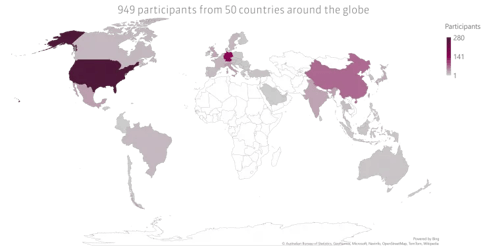
Key Findings
1 | The global trend in the significance of sustainability is growing.
Very high importance was assigned to both, but compliance was still rated higher on average than sustainability. The status of compliance remains at a high level, while sustainability, with its constantly growing importance, is approaching compliance step by step. 61% of all respondents gave sustainability the highest possible rating in terms of importance to their company, coming from 53% last year.
2 | Investments in software solutions for compliance and sustainability are on the rise.
The percentage of companies that rather increase their spending on compliance and sustainability topics grew up to 46%.
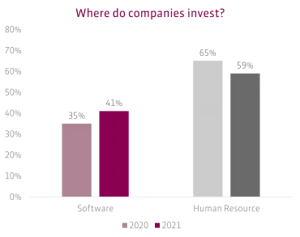
Still 49% of enterprises prefer to keep the spending stable and only 5% plan to decrease spending. The percentage of investment in software solutions is on the rise: if they increase their budget, 41% of respondents are more likely to invest in software than in additional human resources, up from 35% in 2020.
A real-life business case shows that it is actually more profitable to invest in software than in manpower.
The manual effort for the SCIP reporting of one dossier can take a total of 6 hours. With a compliance software solution like iPoint Compliance with its SCIP Connector, one dossier only takes 5 min.
3 | Regulatory compliance is still more in focus than sustainability issues.
Two thirds of companies worldwide focus on compliance rather than on sustainability issues. For 67% of participants, global compliance regulations such as REACH, RoHS, SCIP are their focus topics, while the remaining third (32%) consider one of the three sustainability issues – sustainable products, circular economy or carbon transparency – to be particularly relevant at present.

4 | Large Enterprises are the sustainability front runners.
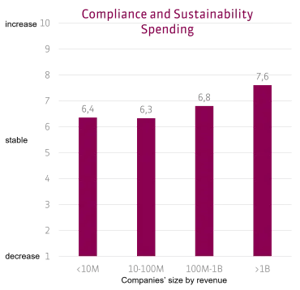
38% of large enterprises focus on sustainability issues rather than global compliance regulations, particularly on Sustainable Products (24%). In small and medium-sized enterprises only 27% attach increased relevance to sustainability issues. Therefore, it is not surprising that large enterprises plan to increase their compliance and sustainability budget to greater extent than enterprises and businesses of smaller size.
5 | In China sustainability has a particularly high significance.
In Asia the importance of sustainability and compliance actually further rose. 81% of Chinese companies attach the greatest importance to sustainability (rating 5), 1% has abstained and the remaining 17% rated 4. Which means that for none of the participating Chinese companies sustainability is of little importance.
Conclusion
The study reveals a strong global trend among companies towards sustainability. Especially large enterprises are moving with the sustainability trend and are front runners. From a regional perspective, sustainability has a particularly high priority in the perception of Chinese companies. However, compliance is not losing its importance for companies. Overall, compliance with global regulations remains more prominent than sustainability goals. These sustainability and compliance trends are leading companies to increasingly invest especially in software solutions to save time and effort.
All results summarized in one paper
Sustainability and Compliance Trends Survey 2022
The trends survey continues. This year, the focus is on Carbon Reduction. Has your company set specific carbon reduction goals? And if not, why? We would highly appreciate if you could take 2 minutes to share your thoughts!
Would you be willing to take 2 minutes and share your opinion?


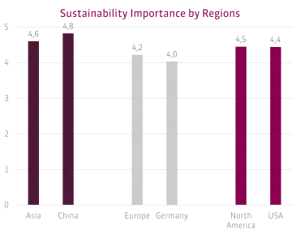

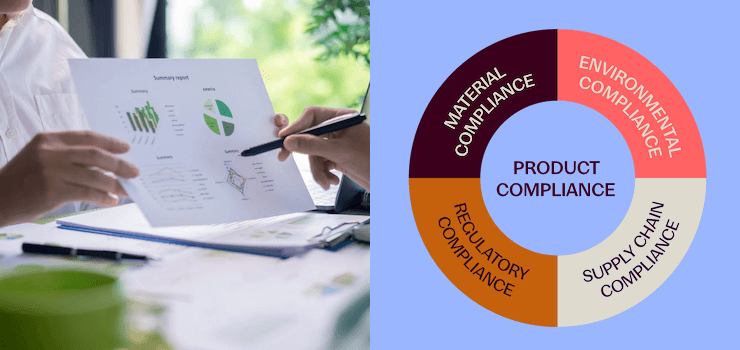

.png)
